Giving Rise to Hope
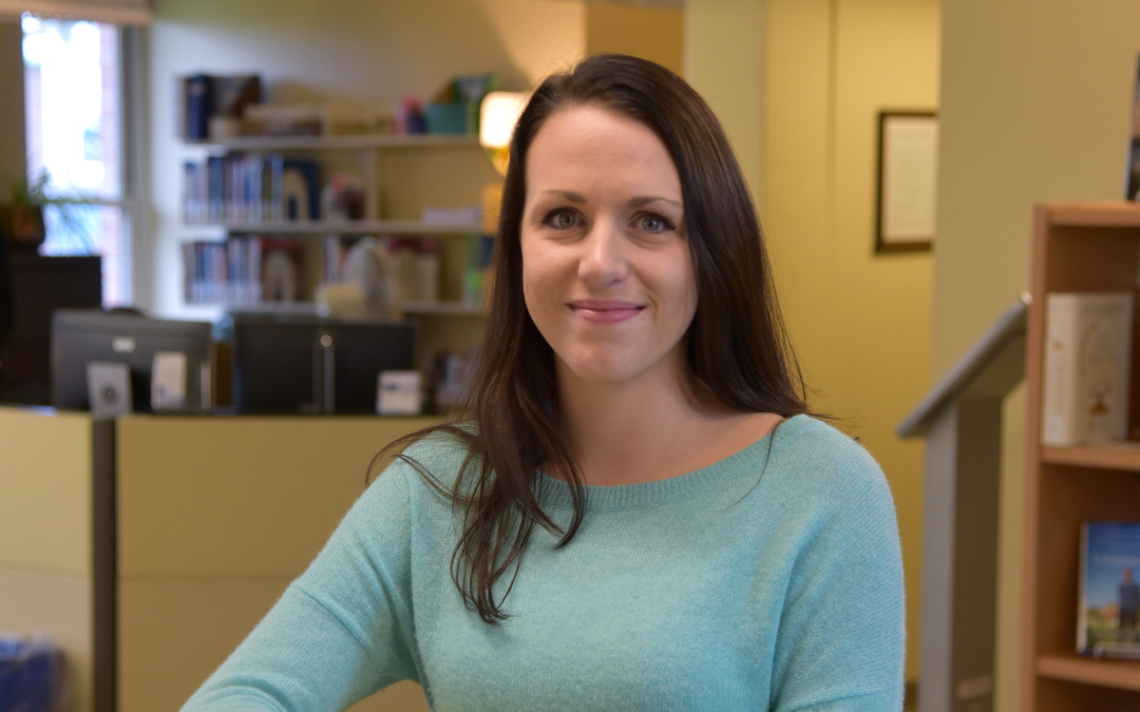
Recently married and with an inquisitive 18-month-old daughter, Catherine Geren smiles when she talks about her life now. The 27-year-old was recently named a rising scholar at the University of Maine at Augusta, where she is studying mental health and human services and works as a library specialist. She then plans to pursue a master’s degree in clinical mental health. It’s a future Cathy says she couldn’t have imagined just three years ago.
“I didn’t really ever think it would be possible,” she says.
In 2015, Cathy became one of the first residents of Hope Rising (now CourageLIVES), arriving just two days after Maine’s first residential treatment program and safe house for survivors of human trafficking opened its doors. It was the beginning of the end of a five-year ordeal.
“I was trafficked from when I was 19 until I was 24 years old,” she says.
Struggling to get along with her parents, who were separated since she was a toddler, Cathy left home at age 17. She stayed with other adults, and for a while, her life seemed to be OK. She graduated from Gorham High School and went to Southern Maine Community College to study culinary arts.
Before long, however, she was introduced to a troubling lifestyle. She began working in strip clubs to earn money and began dating a high school friend who liked to party. It led to him becoming a drug user.
Financially struggling, she says they agreed to rent an apartment for her boyfriend’s dealer, who was from New York but wanted a place to stay when in town. Although uneasy about it, she says he assured them he would rarely be there with them, something that proved not to be the case. She says when her boyfriend ended up in jail, she was left with the man, who, at first, seemed to want to help.
“I was very stressed out financially, and he was like, ‘You’ve worked at a strip club before; you can work at this party in New York with me. It won’t be a big deal,’” she says.
Cathy made the fateful decision to go with him.
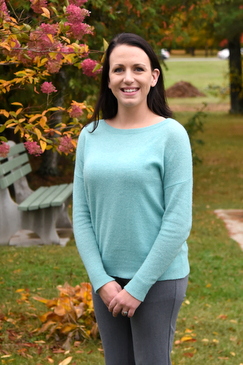
Instead, Cathy was expected to go on “dates” and earn money for sex. Unfamiliar with New York, unsure where to turn, and feeling trapped, she didn’t run away. Soon, that choice would be taken from her.
Cathy says her trafficker set strict rules with violent repercussions if they weren’t followed. She was also given daily quotas to meet for both sex and selling drugs. She says her trafficker marketed her services on a website, and they would travel to different states, mostly on the East Coast.
“Things just progressed and got more and more involved and more and more violent,” she says. “Basically, the only time I spent with other people was with my trafficker or with johns I was doing dates with.”
While she did get away from her trafficker a couple times, sleeping on friends’ couches, she feared staying with them too long.
“It was a safety concern, where my trafficker is a gang member, and I didn’t want to bring any of that on them,” she says.
It was an arrest in Maine that first led Cathy to start getting help. Having become an intravenous drug user during this time, she went through detox and accessed services from Preble Street’s Anti-Trafficking Coalition in Portland. It was difficult, however, because she had no place to live.
“It was winter time and, basically, I had only the clothes I had from working with my pimp. So, I had dresses and heels to walk around and go to drug counseling and to go to different appointments and different services.
“It just was really, really hard. I tried to continue on with that, but I was couch surfing,” she says.
One day, she says her trafficker’s girlfriend drove up as she was leaving a counseling session. Cathy says the woman expressed sympathy, told her that she was no longer with the trafficker, and invited Cathy to come stay with her. Having lived with her in the past, Cathy decided to trust her.
“So, I went with her, and we drove pretty far out into Auburn, more the country part than the city part, and he was there when I got there. After that, he basically didn’t leave me alone at all. He made sure I didn’t have my own phone, and I didn’t have my I.D.’s or anything,” she says.
During this time, she says her probation officer was trying to find her. Eventually, authorities did. She says a South Portland Police detective tried to convince her to let him help her, but she was skeptical.
“I said that I already tried to access services, and it’s put me in a situation that was worse than what I was in to begin with, so thank you for your help, but I would rather go to jail,” she recalls.
The detective, however, was persistent. It was through him that she became connected with Hope Rising, where she stayed for 10 months. It was a life-changing experience.
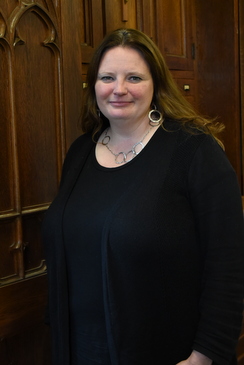
Hope Rising (renamed CourageLIVES in 2019) is a branch of St. André Home, Inc., which was founded by the Good Shepherd Sisters of Quebec more than 75 years ago to help vulnerable women and children. Through the years, that mission has taken many different forms, and in 2015, it gave rise to Hope Rising to help women victimized by human trafficking.
“The sisters said we need to do something to address this. We want to do something to address this, and we have the ability to, and so, the idea sprung forth,” says Carey Nason, the director of Hope Rising.
The home can serve up to five women at a time, with lengths of stay ranging from six months to two years. Staff members help the women address mental health and substance use issues, as well as working with them to develop daily living skills and pursue schooling or careers.
“We have a phased model of treatment, so there are three phases, and in each phase, there are goals or benchmarks that the women are working towards,” explains Carey. “Basically, what are the things that are going to be most helpful for that woman to be able to attain independence, maintain independence, and sustain independence.”
The benchmarks first identify safety and other current concerns, then look to address them and transition beyond them.
“The benchmarks are the same for each person, but then, there are other goals. There are different personal things that will look different for each person,” says Carey.
“It’s just that whole person approach that Hope Rising does that is so helpful,” says Cathy.
Since it opened in 2015, Hope Rising’s residential program has served 30 women, most of whom arrive there through their interaction with law enforcement or the courts. Some, like Cathy, were trafficked since they were teenagers.
That was the case for another survivor, who has been a resident of Hope Rising for nine months. She says when she was 16, she used to hang out at the bus station in a community in another state. It was there that she met someone with whom she hit it off. Expecting they were going to have a relationship, she left home to be with him. She says he brought her to his house and provided her with clothes and food but soon made it clear that they came with a price. She says the man she thought would be a boyfriend was actually the member of a well-known gang.
“He would make comments of how the girls were making money for his friends and that I needed to start putting in the work — that I owed him,” she says. “They brought me into a room, and left me in that room, and walked out and locked the door behind them. They came back a few hours later and held me down, and I was forced to be injected with heroin and was forced to do my first date that night.”
She lived with other girls and moved from house to house, never staying in one place very long. She says there was always the threat of violence against her and her family.
“We would be driving to go do a call, and they would purposely point out the window, and my mother would be walking down the street. They would purposely point it out just to let me know — if you try anything.”
She was arrested for selling drugs for them, but even then, she says she didn’t feel she could break free.
“They made sure I didn’t say anything. They came and picked me up the day I was released,” she says. “I was really never given the opportunity to get away.”
She was arrested again. This time, a caseworker made arrangements for her to come to Maine. She contacted her mother, who moved here as well.
“I thought nobody knew, but I was up here for a couple months and phone calls started coming into my mother’s house from these people. So, I left my mother’s house and went to Lewiston and got an apartment,” she explains.
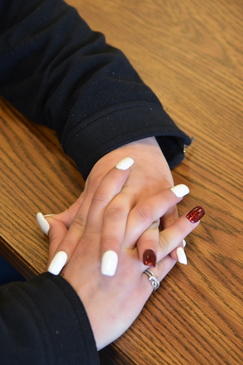
“It was the same thing all over again,” she says.
The end finally came after she was arrested as part of a drug bust that also landed her trafficker in jail. This time, she was able to connect with Hope Rising, which she had heard about through a friend.
Now in her 30s, she is working to build a new life.
“A year ago, I would have given up, but the staff and the residents at Hope Rising help me out on a daily basis. If it wasn’t for Hope Rising, I don’t know where I would be,” she says.
She credits the 24-hour-a-day staff presence and being able to work on goals that she has helped determine.
“Being able to work on what you want, not just what they want you to work on. It’s at your own pace. You’re not on a time limit. It’s when you feel comfortable about it, you can talk about it,” she says.
The fact that the location of the house is kept secret has helped to ease her apprehension.
“I have my confidence back to a point. I’m working on that still,” she says.
“I’ve learned that I can live without looking over my shoulder all the time.”
Another survivor says Hope Rising also helped restore her sense of security, which was stolen by her trafficker.
“I thought I was OK, and I really wasn’t,” she says. “I still had PTSD really bad.”
Like many survivors, her road has been a long one. She says she has battled addiction since being prescribed painkillers for a broken neck when she was 16.
“I was prescribed them for two years, and then, one day, I wasn’t given them anymore, so I started buying them off the street,” she says.
Through the years, she repeatedly tried to get her life back on track, only to relapse again. It was while attending a recovery meeting in Massachusetts that she met someone with whom she thought she could have a supportive relationship.
“They say hindsight is 20/20, and now, I can kind of see how it all played out, but at the time, I didn’t,” she shares.
One day, the man asked her to meet him after work. Thinking nothing of it, she did.
“I met him when I got out of work, and I wasn’t allowed to go home. I had to take only whatever I had on me,” she says. “For the next two and a half months, it was do as I say because if you don’t do what I say, you’re going to get beat up. If you don’t listen to me, you’re going to get beat up. Basically, I need you to support my drug habit and support my criminal enterprise, and you need to bring in this much money a day.”
She got away after staying up one night, waiting for him to fall asleep and roll over, then grabbing a cell phone and running. She contacted authorities, who had been looking for her because she had been reported missing.
“They brought me to an emergency room to have a sexual assault kit done because I was in pretty rough shape. They wanted to document how beaten up I was,” she says.
Although not immediately, with her help, her trafficker was arrested. The ordeal, however, left her shaken.
“For the first two months, I wouldn’t even leave the house. I was just so petrified of my own shadow, and if I did leave the house to go to the store or anything, I always had to have somebody with me,” she says.
She says she tried to get back to “real life,” but failed.
“I was always afraid that something was going to happen,” she says.
Then, last December, she started receiving mailed death threats.
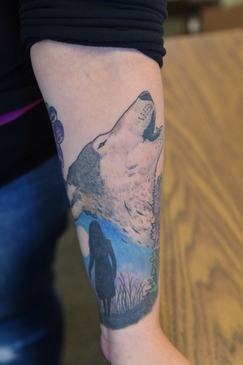
She says her substance use got so out of control that she knew she couldn’t continue to live like that. She checked herself into detox and shared her story with her case manager. Willing to follow his lead, she agreed to his suggestion that she go to Maine.
“I let him drive the bus, and the bus stopped at Hope Rising,” she says. “I’m glad it stopped at Hope Rising.”
She says the residence has meant everything to her.
“It’s given me more than anyplace ever has,” she says. “It’s like I go home every day. It’s not like I’m going back to a rehab. That is literally my family in that house.”
Carey says they strive to make it feel like a home. Each woman has her own room, and there is an emphasis on letting the women make their own choices.
“All of the women have talked about that, what it means to them to have their own physical space. For many women, they have never had that before,” explains Carey. “They don’t remember the last time they got to choose the clothing they want to wear, even something like going to the bathroom when they want to. Those were all choices that were removed from them when trafficked.”
She says, just like a family, the residents and staff at Hope Rising not only support one another but celebrate together, especially birthdays.
“For many women, it’s the first time in their adult lives that they’ve been safe on their birthday, that they’ve been sober on their birthday, that they want to remember their birthday,” says Carey.
She says it’s a gift to be able to see the progress the women make.
“I view myself as just being very blessed and very fortunate that I get to accompany somebody while they’re on their journey,” she says.
It’s an accompaniment that continues after the women leave.
“One of the areas that is growing is our outreach support,” says Carey. “We’re there as much as we’re able to be.”
The women say they are willing to share their stories because they want to raise awareness and help others.
“I do groups with the girls that are at Hope Rising currently. I do survivor leadership groups where I share my experiences. I also do individual mentoring with them, and then, I also do some groups at the local teen shelter,” says Cathy.
The women say it’s important for people to know that human trafficking does happen here.
“Not everyone is out there because they want to be,” says a survivor.
“Sometimes, it just takes a question of asking, ‘Do you need help? Do you want help?’”
And thanks to Hope Rising, getting help is possible.
How you can help:
Hope Rising was established through a grant from the Next Generation Foundation, but it is now primarily funded through the Good Shepherd Sisters’ SCIM
Foundation. If you are able to help the sisters continue this mission, visit www.hoperisingme.org and click on support survivors. You may also send a check to: St. André Home, 168 Prospect St., Biddeford, ME 04005










